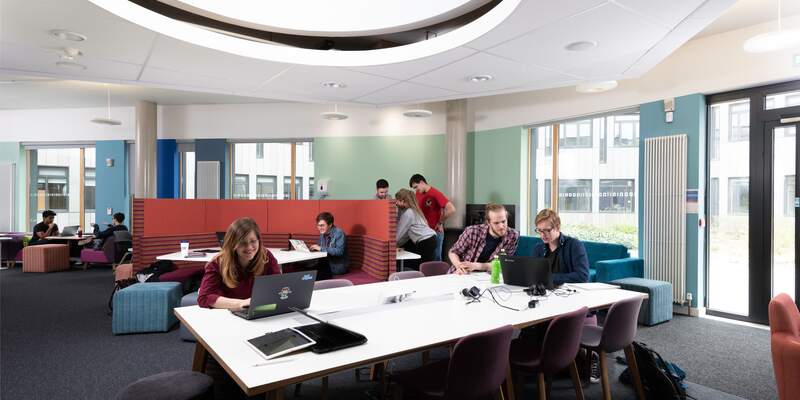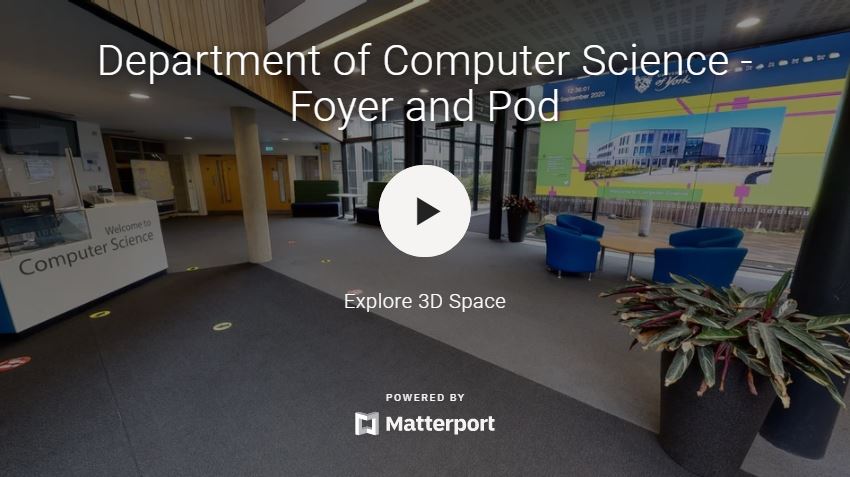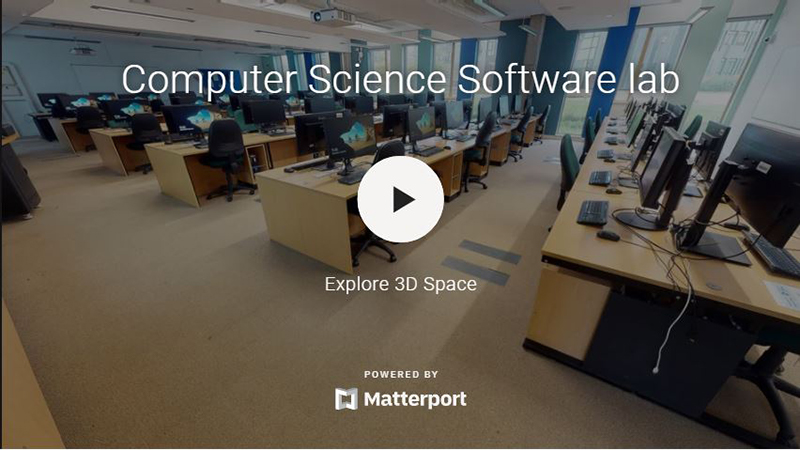
MSc Data Science
Become an expert in analysing our data-driven world.
Year of entry: 2026 (September)
This course produces computational and mathematical engineers with a focused specialism in data science, equipped to make significant contributions to their career field and society as a whole.
The course builds upon your existing skills in computer science (coding, cloud computing, basic machine learning) and mathematics (linear algebra, probability, statistics and calculus). It will develop your training in the field of data science and allow advanced study into a range of specialised domains such as autonomous systems, computer vision, user experience, and advanced software engineering.
Your study is underpinned by three integrated strands which develop mathematical foundations, computational thinking, and engineering skills. It is the holistic combination of these three areas that make graduates attractive to employers.
You'll develop the technical skills needed to critically analyse, mine, and manage different kinds of data in order to learn and discover interesting patterns. The course teaches you how to make actionable conclusions from those assessments, while participating effectively in multidisciplinary teams. You'll also benefit and learn from the Department's expertise in trustworthy systems.
Your study culminates in a focused research project in the field of data science which develops the skills to contribute professionally to solving complex commercial and industrial engineering problems.
Learn more about our range of data science and analytics Masters courses offered at York.
Course content
Modules in semester one will provide you with foundations of understanding the role of data and its analysis in the context of machine learning, which supports many later specialised options. Modules in semester two build on these foundations to address issues relating to system design, trusted data analysis and continuous professional development.
Throughout the course, but particularly in the Professional and Academic Development module, you'll have the opportunity to develop and enhance transferable skills such as analysis of others' work in order to achieve defined goals, and presentation of technical material in a variety of ways for a range of audiences. Additionally, you'll have access to pre-reading material to prepare for the course, as well as support from the Writing Centre and Careers. These courses and services are designed to enhance your language and academic writing skills, and to support you in planning your future career.
Modules
Core modules
- Research Methods in Computer Science
- Foundations of AI and Machine Learning
- Professional and Academic Development
- Cloud-Based Data Analysis
- Intelligent Systems: Probabilistic and Deep Learning
- Governance of Data Science
Our modules may change to reflect the latest academic thinking and expertise of our staff, and in line with Department/School academic planning.
Dissertation
This final project will give you an opportunity to integrate all of the preceding material and build on it to develop a significant piece of work aligned to your own thematic interests within the data science domain.
Learning outcomes
Every course at York is built on a distinctive set of learning outcomes. These will give you a clear understanding of what you will be able to accomplish at the end of the course and help you explain what you can offer employers. Our academics identify the knowledge, skills, and experiences you'll need upon graduation and then design the course to get you there.
Learning outcomes for this course
- Apply computational, mathematical and statistical theory to solve data science problems, using skills in problem analysis, representation, abstraction, programming and software engineering.
- Carefully examine and critically analyse statements, arguments or conjectures that underpin the theory of mathematics and computer science and justify the principles chosen for such critiques.
- Develop advanced computational and mathematical techniques for critical analysis, mining, and cloud-based analysis of data to learn and discover meaningful patterns and knowledge for real world applications. Explore the governance issues of data management.
- Communicate complex ideas in computational and mathematical data science and the discovered knowledge in a clear and organised manner, at a level appropriate for the intended recipients and present an effective summary of these ideas.
- Demonstrate the ability to tackle new and unfamiliar challenges in computational and mathematical data science, recognising appropriate ideas and approaches drawn from a range of technologies, languages, paradigms, models and mathematical theories.
- Analyse and apply computational and mathematical data science skills to practical problems and real-world datasets collected in collaboration with industrial partners, in a safe, ethical, and secure way.

Teamwork is an important part of computer science. Therefore, you’ll spend time discussing maths problems and working on group projects, which can be great fun!
Will, Computer Science student
Fees and funding
Annual tuition fees for 2026/27
| Study mode | UK (home) | International and EU |
|---|---|---|
| Full-time (1 year) | £13,900 | £32,900 |
Fees information
UK (home) or international fees? The level of fee that you will be asked to pay depends on whether you're classed as a UK (home) or international student. Check your fee status.
Find out more information about tuition fees and how to pay them.
Additional costs
There are unlikely to be any mandatory additional costs associated with the course, although you may want to set aside £200 for optional photocopying and personal stationery over the duration of the course.
Funding information
Discover your funding options to help with tuition fees and living costs.
We'll confirm more funding opportunities for students joining us in 2026/27 throughout the year.
If you've successfully completed an undergraduate degree at York you could be eligible for a 10% Masters fee discount.
Funding opportunities
Chevening Scholarships
We are pleased to work with Chevening Scholars to offer funding for our Masters programmes. Chevening Scholarships provide one year of fully-funded postgraduate study in the UK for international (including EU) students. The scholarships are open to early and mid-career professionals who have the potential to become future leaders.
Teaching and assessment
You’ll work with world‐leading academics who’ll challenge you to think independently and excel in all that you do. Our approach to teaching will provide you with the knowledge, opportunities, and support you need to grow and succeed in a global workplace.
Teaching format
Part of this course is taken up by taught modules. Each module comprises a mix of lectures, problem classes and practical classes, plus personal study time. You should expect to be working on open assessments during vacation periods. Throughout the course you will have a personal tutor, who will provide academic and pastoral advice.
In the second half of the course, you'll undertake an individual research project under the supervision of a member of staff. When you undertake your individual project, you will be allocated a supervisor within your area of interest. Work on your individual project will start around the beginning of April, and you will receive regular one-to-one supervisions throughout your project. You will continue to work on your individual project over the summer, and there will be continuing supervision and research-group meetings to discuss your project. You will finish the course when you hand in your dissertation and paper for your project in September.
Due to the intensive nature of the course, you will need to be in York throughout both semesters and over the summer while you undertake your individual project.
Facilities
Built to the highest specifications, the Department is packed with cutting-edge facilities housed in a modern, self-contained building.
The Department houses four software labs and two hardware labs. One of the hardware labs is equipped with dedicated Cyber Lab infrastructure required for several of your practical classes.
Our study and social pod is open 24/7 for group and individual study. It can also be booked for student society meetings and for events.
Find out more about our facilities, including a video tour showing our labs, teaching and research spaces.
Teaching location
Computer Science is based on Campus East. The majority of teaching on this course takes place on Campus East in the Ian Wand Building and Ron Cooke Hub.
About our campus
Our beautiful green campus offers a student-friendly setting in which to live and study, within easy reach of the action in the city centre. It's easy to get around campus - everything is within walking or pedalling distance, or you can always use the fast and frequent bus service.
Assessment and feedback
We assess modules in a variety of ways, including group work, practical exercises, coursework and closed examinations. Your project assessment will be made up of a dissertation.
Assessments take place at various times during the year. Closed examinations are taken in the three-week assessment periods at the end of each semester.
Practical exercises, reports and other forms of open assessment typically occur towards the end of the teaching sessions of a module. Work for these assessments must be submitted by fixed deadlines normally well after the conclusion of the taught sessions.
Careers and skills
Skills for employability are embedded throughout the programme, with many opportunities for you to return to these during the course. Industrial case studies are used in several modules. Many modules use real-world data sets to inform and motivate the material presented. Several optional modules will have invited talks from graduate employers.
Career opportunities
- Programming engineer
- Software developer
- Higher education teaching and research
- Information analyst and app developer
- Systems architect
- Business analyst
Transferable skills
- Apply advanced computational thinking to complex problems encountered.
- Apply specialist knowledge in areas, such as Interactive Technologies, to complete research and development tasks requiring knowledge beyond that typically acquired in a first degree in computer science.
- Identify, evaluate and summarise cutting-edge research literature and apply as relevant to project goals.
- Improved communication and organisational skills.
Entry requirements
| Qualification | Typical offer |
|---|---|
| Undergraduate degree | 2:2 or equivalent undergraduate degree in Computer Science or a related field. The degree should have modules in programming, mathematics, and algorithms or data science |
| Other international qualifications | Equivalent qualifications from your country |
English language
If English isn't your first language you may need to provide evidence of your English language ability. We accept the following qualifications:
| Qualification | Minimum requirement |
|---|---|
| IELTS (Academic and Indicator) | 6.5, minimum 6.0 in each component |
| Cambridge CEFR | B2 First: 176, with 169 in each component |
| Oxford ELLT | 7, minimum of 6 in each component |
| Oxford Test of English Advanced | 136, minimum 126 in each component |
| Duolingo | 120, minimum 105 in all other components |
| LanguageCert SELT | B2 with 33/50 in each component |
| LanguageCert Academic | 70 with a minimum of 65 in each component |
| Kaplan Test of English Language | 478-509, with 444-477 in all other components |
| Skills for English | B2: Merit overall, with Pass with Merit in each component |
| PTE Academic | 61, minimum 55 in each component |
| TOEFL | 87, minimum 21 in each component |
| Trinity ISE III | Merit in all requirements |
For more information see our postgraduate English language requirements.
If you haven't met our English language requirements
You may be eligible for one of our pre-sessional English language courses. These courses will provide you with the level of English needed to meet the conditions of your offer.
The length of course you need to take depends on your current English language test scores and how much you need to improve to reach our English language requirements.
After you've accepted your offer to study at York, we'll confirm which pre-sessional course you should apply to via You@York.
Next steps
Contact us
Get in touch if you have any questions

Department
Related courses
- Advanced Computer Science (MSc)
- Artificial Intelligence (MSc)
- Cyber Security (MSc)
- Mathematical Science (MSc)
- Data Science (Artificial Intelligence and Statistics) (MSc) (Department of Mathematics)
- Data Science (Human Behaviour) (MSc) (Department of Psychology)
- Data Science (Scientific) (MSc) (Department of Chemistry)
- Bioinformatics (MSc) (Department of Biology)
- Business Analytics (MSc) (School for Business and Society)
Discover York






.jpg)


